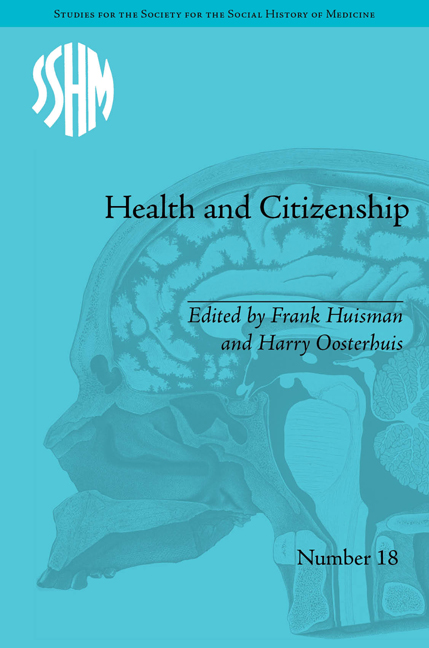Book contents
- Frontmatter
- CONTENTS
- Acknowledgements
- List of Contributors
- The Politics of Health and Citizenship: Historical and Contemporary Perspectives
- Part I Liberal Citizenship and Public Health
- Part II Social Citizenship: Health in the Welfare State
- Part III Neo-Republican Citizenship: Health in the Risk Society
- Notes
- Index
Part II - Social Citizenship: Health in the Welfare State
- Frontmatter
- CONTENTS
- Acknowledgements
- List of Contributors
- The Politics of Health and Citizenship: Historical and Contemporary Perspectives
- Part I Liberal Citizenship and Public Health
- Part II Social Citizenship: Health in the Welfare State
- Part III Neo-Republican Citizenship: Health in the Risk Society
- Notes
- Index
Summary
From the 1840s onwards, many physicians called for social and political reform. As the detrimental effects of industrialization and urbanization became clear, public health schemes were proposed all over Europe, especially after the revolution of 1848. Their implementation was not, however, without problems and contradictions. The reluctance of liberals who refused to abandon the principle of laissez-faire was one such problem, but so was ambivalence among physicians. While the physicians as professionals welcomed some degree of protection by the state, they feared subordination to it. Most of all, the implementation of public health policies was hesitant because it proved difficult to reconcile the ideal of freedom with that of equality. Classical ‘rights of ’(property, free speech) were to be extended with ‘rights to’(labour, income, health care), which implied an entitlement. The basic question was always how to organize distributive justice in a way that was acceptable to all members of society. Liberalism had always held that assistance to the sick and the poor should only be a moral obligation for the donor rather than an entitlement of the recipient. Over the course of the nineteenth century, however, governments came to realize that public assistance had become a social necessity to counter epidemics, crime and even revolution. Part II of this volume – roughly covering the period from the mid-nineteenth to the late-twentieth century – is devoted to social citizenship.
- Type
- Chapter
- Information
- Health and CitizenshipPolitical Cultures of Health in Modern Europe, pp. 119 - 122Publisher: Pickering & ChattoFirst published in: 2014

